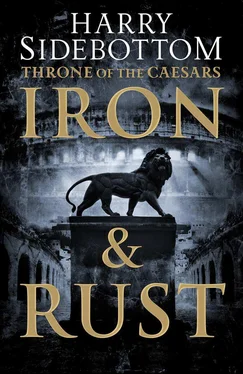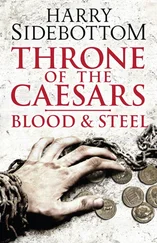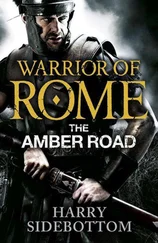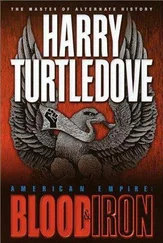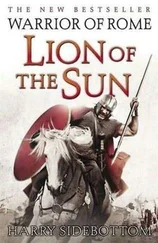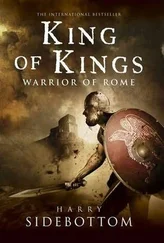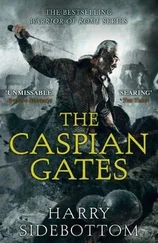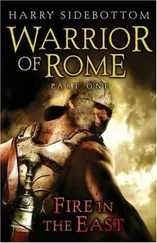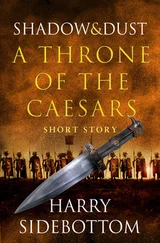Harry Sidebottom - Iron and Rust
Здесь есть возможность читать онлайн «Harry Sidebottom - Iron and Rust» — ознакомительный отрывок электронной книги совершенно бесплатно, а после прочтения отрывка купить полную версию. В некоторых случаях можно слушать аудио, скачать через торрент в формате fb2 и присутствует краткое содержание. Год выпуска: 2014, Издательство: HarperCollins Publishers, Жанр: Исторические приключения, на английском языке. Описание произведения, (предисловие) а так же отзывы посетителей доступны на портале библиотеки ЛибКат.
- Название:Iron and Rust
- Автор:
- Издательство:HarperCollins Publishers
- Жанр:
- Год:2014
- ISBN:нет данных
- Рейтинг книги:4 / 5. Голосов: 1
-
Избранное:Добавить в избранное
- Отзывы:
-
Ваша оценка:
- 80
- 1
- 2
- 3
- 4
- 5
Iron and Rust: краткое содержание, описание и аннотация
Предлагаем к чтению аннотацию, описание, краткое содержание или предисловие (зависит от того, что написал сам автор книги «Iron and Rust»). Если вы не нашли необходимую информацию о книге — напишите в комментариях, мы постараемся отыскать её.
Iron and Rust — читать онлайн ознакомительный отрывок
Ниже представлен текст книги, разбитый по страницам. Система сохранения места последней прочитанной страницы, позволяет с удобством читать онлайн бесплатно книгу «Iron and Rust», без необходимости каждый раз заново искать на чём Вы остановились. Поставьте закладку, и сможете в любой момент перейти на страницу, на которой закончили чтение.
Интервал:
Закладка:
Fear feeds on inactivity, like a sleek rat in an unfrequented feed shed. Timesitheus knew all about fear, although so far, somehow, he had never given way. The trick was to occupy your thoughts with something else. Now, he summoned up the outlines of the great commission laid upon him. But would it still be his task by the end of the day? He stowed the doubt deep down in the hold of his mind, battened the hatches. The image came naturally to a Greek from his island. Over the years it had served him well.
The logistics of a full-scale imperial campaign into free Germania were daunting. Vast numbers of soldiers and animals, huge amounts of food and fodder, mountains of ancillary items — tents, replacement weapons, boots and uniforms, prefabricated defences, dismantled siege weapons and bridging equipment, miscellaneous ropes and straps, ink and papyrus, sutlers, servants and whores — had to be assembled here at Mogontiacum and then moved into what remained largely terra incognita. Despite nearly three centuries of intermittent campaigning, the Romans were still remarkably ignorant about the geography of northern barbaricum . Before setting out from Rome he and some of the other advisers of the previous Emperor had used detailed itineraries to plan the stages of each day’s march to the frontier. All had been published in advance: which roads which units would use, where the supplies were to be gathered, when the Emperor would arrive in each town. Beyond the Rhine there were no maps, and all was vague.
In the East, the Euphrates and the Tigris helped. The great rivers ran away from Roman territory into that of the Persians. They made it harder to get lost. Supplies could accompany your forces downriver on boats. Movement of bulk goods was always infinitely easier and cheaper by water. The rivers of the North were not so amenable. Somewhere beyond the Rhine was the Ems, beyond that the Weser, and beyond them the Elbe. Timesitheus was diligent and had learnt of the yet more distant Oder and Vistula. All these rivers ran across the line of advance. If anything, they were likely to prove barriers.
And in the East there were roads and cities; proper roads which had been used for millennia, some of them paved, and Hellenic cities founded by Alexander and his successors. Both were lacking in the North. Nothing to march down, and no tempting target at which to aim. Nothing but tracks and woods, wilderness and marsh.
The absence of roads exercised Timesitheus. Almost all Roman units moved at least a part of their equipment by wagon and cart. These would all have to be replaced by pack animals. It would be expensive and resented. But it had to be done. What Timesitheus needed were accurate figures for existing transport animals and the numbers of men serving with the standards. The latter would prove particularly hard to get at, given the prevailing corruption of the previous regime. Under-strength units still drew the pay due their numbers on papyrus; the differences found their way into various private coffers.
‘Come,’ Sanctus said.
Timesitheus had not noticed the approach, but now followed the abAdmissionibus .
They passed through the heavy hangings into the purple-tinted labyrinth. At least it was good to be out of the wind. Sanctus led them left and right, this way and that, along silent corridors and through empty halls where unseen voices whispered. They went through shade and deeper darkness, seemingly turning back on themselves. At last, like initiates at Eleusis or some other mystery cult, they emerged into the throne room.
A shaft of light was arranged to fall from directly above on to the seated Emperor. The ivory of the throne gleamed. Maximinus sat robed and immobile, like a gigantic statue of porphyry and white marble.
On the right hand of the Emperor stood Anullinus. No surprise there, Timesitheus thought. Everyone knew there had been three of them, but Anullinus was the only one whose identity was certain. It was the Prefect of the Armenians who had beheaded the young Emperor and his mother. Camp gossip held he had stripped the old woman naked, outraged her headless corpse. Anullinus was wearing armour and a sword on his hip. Was it the one with which he had killed them? Had it been in this room? Motionless in the half-light, Anullinus’ eyes exuded brutality and menace.
Two togate figures on Maximinus’ left. Nearest to Maximinus was Flavius Vopiscus. It was common knowledge that the Senator from Syracuse, together with Honoratus, had orchestrated the change of regime. The latter was not yet returned from Rome. So Flavius Vopiscus stood closest to the Emperor they had created. The consummation of his designs did not seem to have lightened the demeanour of the Sicilian. As ever, he looked haunted. Pious to a fault or just riddled with superstition, it was said he dared not embark on the simplest endeavour — getting dressed or going to the baths — until he had consulted the sortesVirgilianae . How many times had he had to unroll the Aeneid and stab his finger on a random line before he considered the gods had guided him to one that read propitiously for the breaking of sacred oaths, for treason and murder?
The other toga-clad figure was less expected. Caius Catius Clemens — the middle of the three brothers — commander of the 8th Augustan legion and legate to his eldest sibling, the governor of Germania Superior. So Priscillianus had been more cold than apprehensive when they were waiting. A terrible thought caught Timesitheus. He could feel the teeth of the rat gnawing, hear the scrabble of its paws. His brother would have told Priscillianus everything that was about to happen. Perhaps, outside the pavilion, in front of dozens of witnesses, Priscillianus had not wished to be too closely associated with a man bound to the wheel on its downward turn. Again, Timesitheus hurriedly forced his fear down deep.
As was proper, the ex-Consul Priscillianus approached the Emperor first. Priscillianus came close and waited for a hand to be extended so that he could kiss the ring bearing the imperial seal. Instead Maximinus raised one of his great hands palm out.
‘While I reign, no man will bow his head to me.’ Maximinus’ voice was deep, grating like a mill wheel.
Timesitheus gave a manly, Roman salute; nothing of the Hellene about it at all. He could have been an officer of the old, free Republic before Cannae. That was an ill-omened thought. He altered the image to before the gates of Carthage or Corinth, or some other wealthy city through whose streets the Romans had killed and raped in their heyday.
Behind Anullinus there were two men: Domitius, the Prefect of the Camp, and Volo, the head of the frumentarii . The latter commanded the imperial spies and assassins and was feared throughout the empire. The former dealt with latrines, horse lines and bundles of hay. Yet it was the presence of Domitius that worried Timesitheus more. He had heard that Domitius had survived the coup, but he had not known that he had remained in his post. Timesitheus very much hoped Domitius had not been a part of the plot.
It had started some years earlier in the East. Three men — all equestrians — had been charged with securing the supplies for the Persian war of Alexander Severus. One had been Timesitheus, another Domitius. Timesitheus had taken no more than was customary; if anything, rather less: just the usual presents, certainly no more than one part in ten. His wife had chided him with his restraint; but then Tranquillina was ever boldness itself. The spouse of Domitius would have had no grounds for complaint. His peculation had been egregious. Units had marched hungry and with no boots, the money having vanished into the ledgers of Domitius. Each man had threatened to denounce the other. No charge had been lodged, but by the time the campaign limped to an inglorious close, the enmity was deeply rooted.
Читать дальшеИнтервал:
Закладка:
Похожие книги на «Iron and Rust»
Представляем Вашему вниманию похожие книги на «Iron and Rust» списком для выбора. Мы отобрали схожую по названию и смыслу литературу в надежде предоставить читателям больше вариантов отыскать новые, интересные, ещё непрочитанные произведения.
Обсуждение, отзывы о книге «Iron and Rust» и просто собственные мнения читателей. Оставьте ваши комментарии, напишите, что Вы думаете о произведении, его смысле или главных героях. Укажите что конкретно понравилось, а что нет, и почему Вы так считаете.
